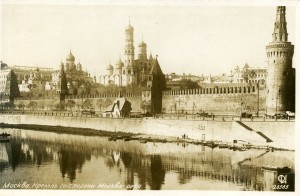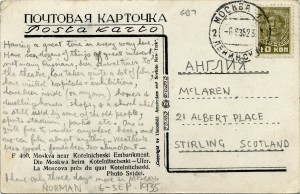The award-winning experimental filmmaker Norman McLaren travelled to many parts of the world and seemed to have a knack for visiting interesting places in interesting times. He was in Spain during the Civil War shooting footage for the film The Defence of Madrid. In 1949 he had an unexpectedly extended stay in China when the communist revolution overtook the UNESCO project he was working on. And he spent several months in India in 1952-53 educating local filmmakers.
In September 1935 McLaren travelled to Moscow as a tourist. At the time McLaren was attending the Glasgow School of Art where he was one of many students who embraced the idealism of the Soviet project which was so effectively promoted by the Russian art and film of the period. McLaren’s father had no time for Norman’s youthful idealism and, so the family story goes, he paid for Norman to visit Moscow in the hope that the reality of life in Russia would puncture his idealised views of the Soviet Union.
The Norman McLaren Archive includes a postcard that McLaren sent back to his father from Moscow. Written on the 6th September 1935 Norman’s account of his visit reveals that his father’s efforts didn’t have the desired effect:
“Having a great time in every way here. Have seen dozens of things of great interest; met many Russians, been several times to the theatre, have taken quite a lot of film; have visited hospitals and exhibitions, have been inside (on my own) homes and dwelling houses, shops, and a church which is still used by some of the old people, a sports stadium, parks, etc. One is quite free to wander anywhere here, and one can film almost anything. Weather’s been good – food been too abundant – I have only three days more in Moscow. NORMAN.”

This postcard is part of a collection of over 400 letters and postcards Norman McLaren wrote to his parents in Stirling over a 30 year period beginning in 1935. The letters were written on a regular, sometimes weekly, basis and include information on the development of his career, accounts of his travels and discussions of his work, alongside family business and personal information.
